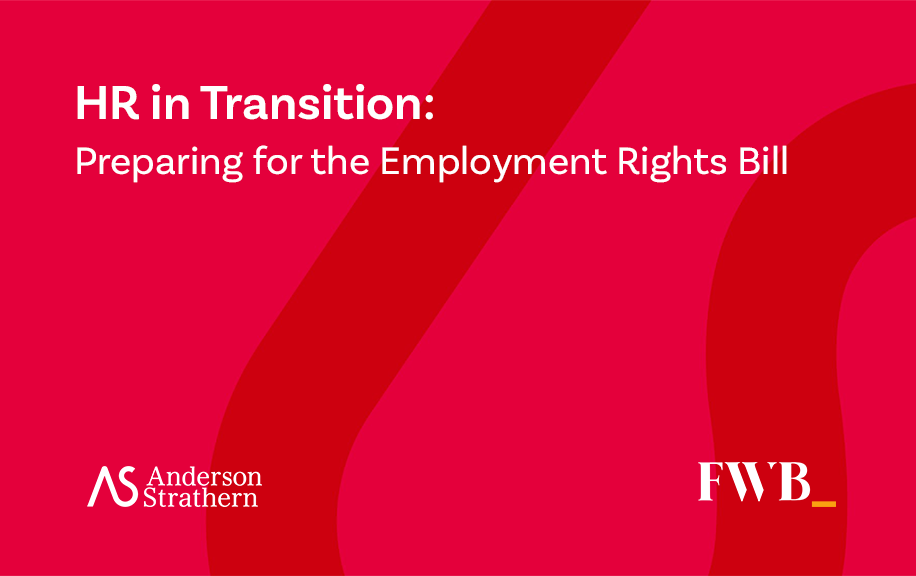Contact the team at FWB to discuss your individual or company requirements, or to discover more about our specialist services.
HR in Transition: Preparing for the Employment Rights Bill
16 June 2025
- FWB Events

In partnership with Anderson Strathearn, we hosted a group of leading HR professionals for a timely and insightful discussion unpacking the forthcoming Employment Rights Bill and its implications for employers across the UK.
Katie Gilmartin, FWB, welcomed the group and highlighted the importance of peer-led discussions in navigating the evolving employment landscape. With many of the provisions of the Employment Rights Bill expected to come into force in Autumn 2026, this event provided a crucial opportunity to explore the bill’s provisions, challenges, and opportunities.
A Bill of Broad Impact
Dawn Dickson and Andrew Brown, partners at Anderson Strathearn, led the session, outlining the bill’s key reforms, including:
Unfair Dismissal: A shift to a “day one” right, with a proposed likely nine-month early period of employment during which a ‘light-touch’ dismissal procedure will apply, marks a significant departure from the current two-year threshold. This change could potentially increase Employment Tribunal claims and reshape probationary practices.
Third-Party Harassment: Employers will be required to take proactive, preventative steps to protect employees from harassment by clients, customers, or other third parties. This reintroduction of employer liability is particularly impactful for customer-facing organisations.
Flexible Working: Employees already have the right to request flexible working from day one, and employers will be required to provide clear reasons for the reasonableness of any refusal to grant flexible working arrangements. The discussion touched on the post-COVID shift towards hyper-personalised working arrangements and the potential for indirect discrimination claims.
Family Rights: Enhanced protections include day-one rights to paternity leave and pay, bereavement leave, and stronger safeguards for employees returning from maternity leave.
Zero-Hour and Low-Hours Contracts: Employers will face new duties to offer guaranteed hours after a (likely)12-week reference period, along with obligations around shift notice and notice of cancellations. While aimed at improving job security, these changes pose administrative challenges, especially for those employing seasonal and project-based workers.
Collective Consultation: The threshold for mandatory consultation remains at 20 redundancies within 90 days, but penalties have doubled to 180 days’ pay. Attendees noted the fluidity of this provision and the risk of preparing for a version of the bill that may yet change.
Fire and Rehire: A near-ban on the practice, with limited exceptions for extreme financial hardship, could complicate contract renegotiations. Attendees discussed that whilst the practice can sometimes be controversial, it is often used for very legitimate causes to save businesses; they also raised concerns about employer flexibility and the growing influence of trade unions under the bill’s new provisions.
Equality and Inclusion: Employers will be required to publish action plans addressing gender pay gaps, ethnic diversity, and inclusion. This marks a shift towards measurable accountability in workplace equality.
Fair Work Agency: A new enforcement body will be established with powers to inspect, fine, and bring civil proceedings, reducing the burden on individual employees to pursue claims.
Working Time Records: Employers must maintain six years of records on annual leave and pay, adding to the administrative load.

Preparing for Change
While the bill’s full implementation is not expected until Autumn next year, we delved into a deep discussion shaped around the concern: How can employers prepare now for legislation that remains in flux?
- Reviewing recruitment, disciplinary, and performance procedures.
- Conducting risk assessments for third-party harassment.
- Providing guidance and training for managers on how to reasonably assess flexible working requests.
- Establishing administrative processes for managing zero-hour, low-hour, and agency worker obligations.
- Conducting internal reviews and setting clear, measurable equality goals.
- Updating redundancy processes and training staff on new collective consultation criteria.
- Familiarising employees with new trade union practices and ensuring they understand their rights.
- Reviewing record-keeping practices to ensure compliance with new working time regulations.
- Reassessing litigation budgets in anticipation of potential increases in claims.
One attendee noted, ‘The danger is learning the bill inside out now, only to find it’s changed by the time it’s enacted’. Nonetheless, the consensus was clear: early preparation, internal reviews, and proactive training will be key to navigating this transition.
A cultural shift
The event closed with a reflection on the broader cultural implications of the bill. The new legislation signals a shift in workplace norms, placing greater emphasis on employee dignity, fairness, and accountability.





